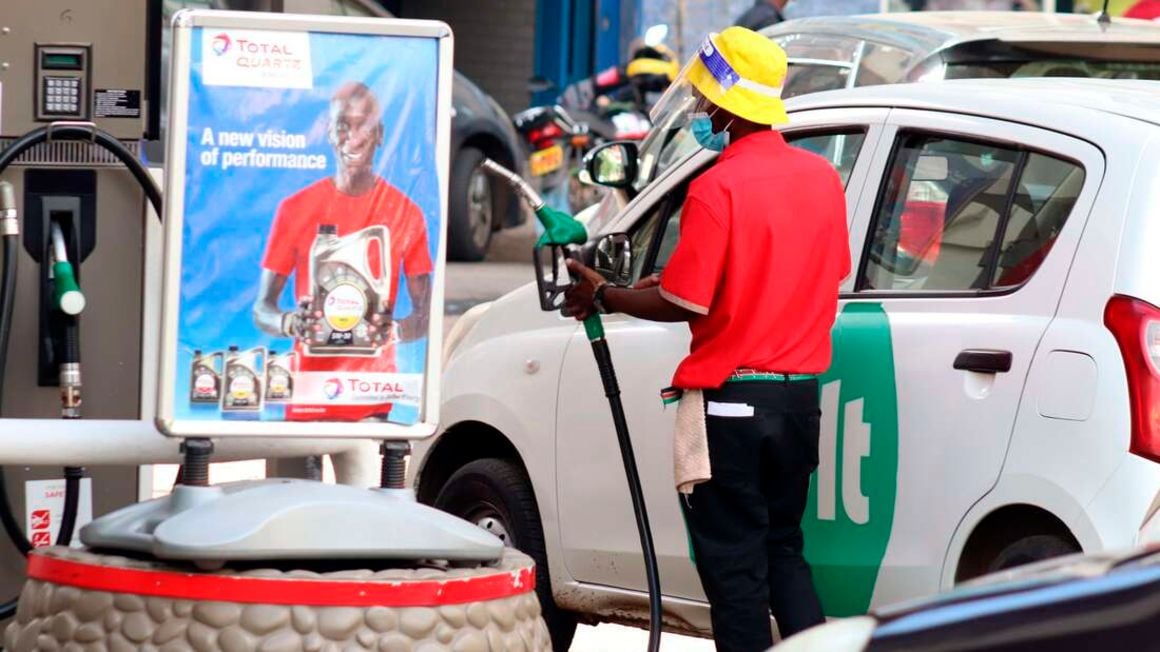
A Total fuel station in Nairobi. FILE PHOTO | NMG
Motorists will be spared the pain of rising crude oil costs after the State opted to retain subsidies on fuel prices to defuse outrage by Kenyans already squeezed by the high cost of living.
Mining and Petroleum chief administrative secretary John Musonik told Parliament Thursday that the State will continue tapping into the Petroleum Development Fund— a special scheme created to cushion motorists, businesses, and households from high petrol, diesel and kerosene costs as it reviews all the components used to determine fuel prices.
“From April we have been using the fund. For now, we are going to stabilise the prices as we look at all the other components in the pricing,” Mr Musonik told the Senate Committee on Energy.
The scheme is meant to be activated whenever global oil prices go beyond the $50 (Sh5, 486) per barrel mark.
The subsidy is drawn from billions of shillings raised from fuel consumers through the petroleum development levy, which was increased to Sh5.40 a litre in July last year from Sh0.40.
The subsidy fund, which has raised more than Sh15 billion, has see consumers save an average Sh14.59 and Sh19.54 per litre of diesel and kerosene, respectively, since April.
Consumers were also spared Sh8.01 per litre on super petrol in the price reviews for April and July.
This kept the cost of a litre of petrol at Sh127.14 in also spared Sh8.01 per litre on super petrol in the price reviews for April and July.
This kept the cost of a litre of petrol at Sh127.14 in Nairobi, which would have increased to Sh130.71 without the subsidy—a high in Kenya’s history.
This would have piled more pressure on motorists, businesses, and households at a time the coronavirus pandemic has hurt their purchasing power.
Global crude prices have been climbing, buoyed by an improved outlook for demand as increased Covid-19 vaccinations help lift travel curbs.
For instance, crude prices rose from $36.34 in June last year to $63.35 last month, setting the stage for a sharp increase in fuel prices.
This rebound has prompted action by the State due to heightened risks of imported inflationary pressure that would reflect on consumer products and services in months and possibly trigger more outcry by households smarting from the economic shocks of the pandemic.
The move to continue tapping the subsidy funds to protect motorists from high fuel prices comes amid growing calls for a review of the pricing formula used to set diesel, petrol, and kerosene prices in the monthly review.
There are seven levies and two taxes that the Energy and Petroleum Regulatory Authority (Epra) uses to determine fuel prices, including excise duty, petroleum development levy, petroleum regulatory levy, and railway development levy.
Others are the merchant and shipping levy, import declaration fee, value added tax and anti-adulteration levy.
These taxes and levies account for Sh57.77 per litre of super petrol, Sh45.52 per litre of diesel, and Sh39.72 per litre of kerosene and were blamed for the sharp increase in product prices in the review from March 15 to April 14.
Fuel prices hit a nine-year high in March, with a litre of super petrol retailing at Sh122.81 in Nairobi and diesel rose to Sh107.66, prompting public outrage on the rising cost of living.
The price rise shifted the spotlight on taxation of petroleum products, with Kenyans in border towns reportedly seeking cheaper fuel in the neighbouring countries of Tanzania and Uganda.
But the State has since April kept diesel and kerosene prices unchanged while petrol prices have not increased since last month.
High fuel prices have a direct impact on Kenya’s diesel-driven economy with producers of electricity and manufactured goods passing the cost to consumers.
The majority of the population relies on kerosene and gas for lighting and cooking, making crude price a key determinant of the rate of inflation.


No comments:
Post a Comment